Archaeological Institute of America
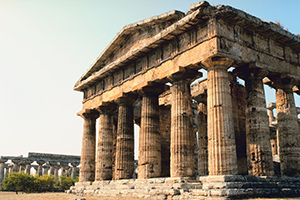
Deadline: November 1, 2024
Announced: By March 1
Amount: $26,000
Purpose: For travel and study to be conducted between July 1 of the award year and the following June 30. Preference will be given to projects of at least a half-year’s duration. The award is to be used for travel and study in Greece (the modern state), Cyprus, the Aegean Islands, Sicily, southern Italy (that is, the Italian provinces of Campania, Molise, Apulia, Basilicata, and Calabria), Asia Minor (Turkey) or Mesopotamia (that is, the territory between the Tigris and Euphrates rivers, that is modern Iraq and parts of northern Syria and eastern Turkey). Although the proposal may require travel outside these areas, the majority of travel proposed must be within them. The award is not intended to support field excavation projects. AIA fellowship funds may not be used for institutional overhead, institutional administrative recovery costs, or institutional indirect costs.
Requirements:
The AIA welcomes applicants of all backgrounds and is committed to equal opportunity for all. Under no circumstances will the AIA discriminate against qualified individuals on the basis of race, color, religious creed, retaliation, national origin, ancestry, sexual orientation, gender, disability, mental illness, genetics, marital status, age, veteran status, or any other basis prohibited under applicable law.
As part of the Archaeological Institute of America’s ongoing commitment to fieldwork and families, reasonable line items for the care of dependent and elderly family members are allowable expenses for AIA grants, fellowships, and scholarships.
Please note that all application materials (including references and transcripts) must be received at the AIA by the November 1 deadline.
View the Fellowship Requirements and Application Guidelines.
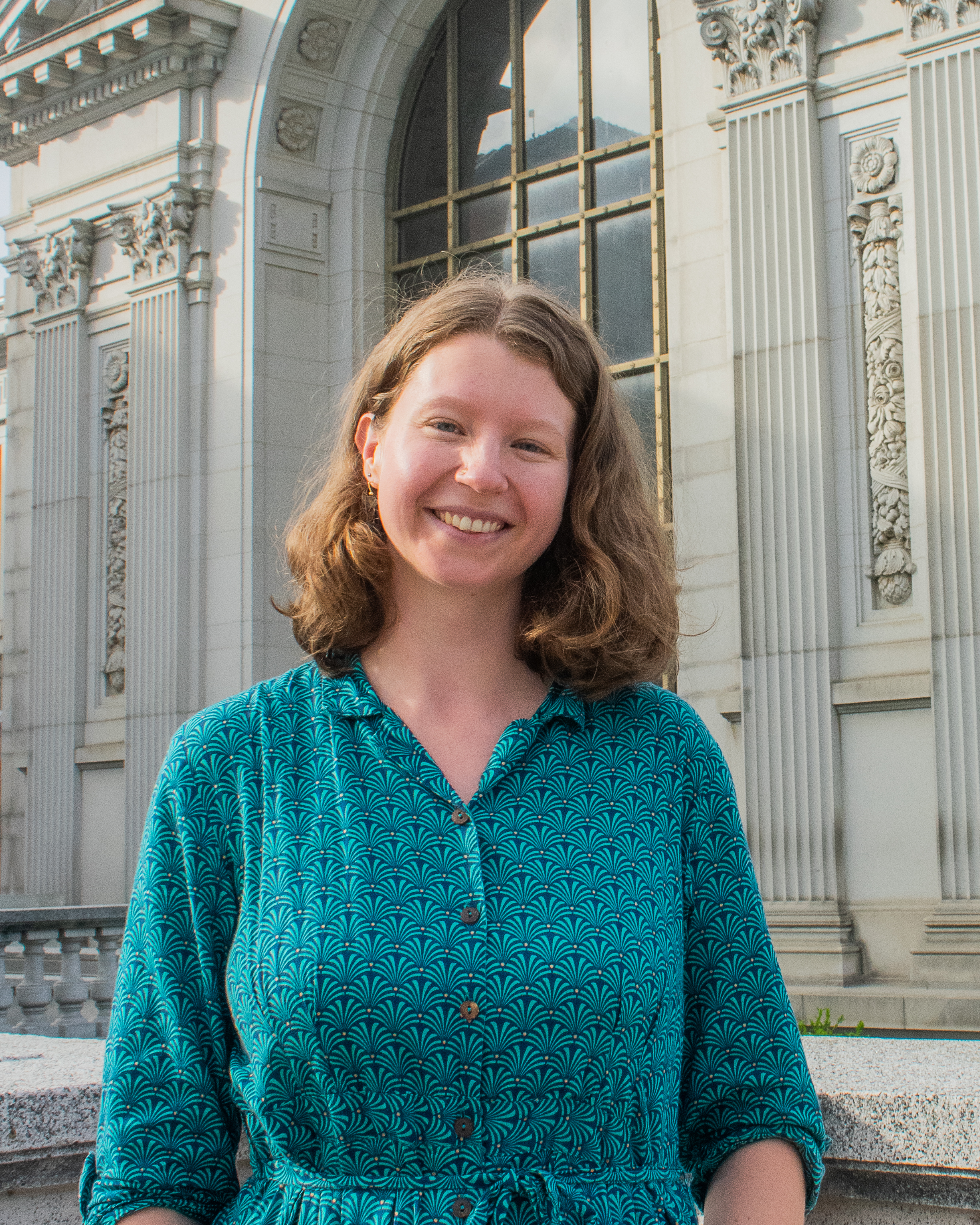
2024
UC Berkeley
The 2024 AIA Olivia James Traveling Fellow, Susanna Faas-Bush (PhD Candidate, UC Berkeley), will look at legacy data from the 1895-1899 excavations of the Villa Pisanella outside of Pompeii as part of her dissertation research. Though the villa is famous for the Boscoreale Treasure, a hoard of silver and gold Roman artifacts left behind after the eruption of Mt. Vesuvius, Faas-Bush will be turning her attention to the extensive, well-documented set of day-to-day objects recovered from the site to reconstruct a more nuanced picture of daily life at the villa for both its wealthy owners and the enslaved laborers who lived there. Faas-Bush will examine the portable material recovered from the villa to determine what the objects’ locations and wear-and-tear via usewear analysis can reveal about daily activities for various classes of inhabitants within the villa. She will perform cluster correspondence analysis of the objects found on the site, considering their distribution with regards to the structural elements and affordances of the spaces (such as access to light, available workspace, and room privacy), and also in comparison with other Vesuvian villas. The AIA Fellowship funds will support her travels to the Field Museum in Chicago; the Antiquarium in Boscoreale, Italy; the Museo Archeologico Nazionale and Federico II in Naples; and the Louvre in Paris where she will examine collections and documents from the 19th-century excavations of the Villa Pisanella and consult with others working on Pompeian legacy excavations. The AIA Fellowship will support Faas-Bush in her efforts to complete her dissertation and create a database of the objects studied throughout her travels that she will make available for future scholars to access in digital format, revitalizing a valuable source of information about life in ancient Pompeii.

2023
Sarah Hilker, PhD Candidate at the Department of Classics, University of North Carolina at Chapel Hill, is the 2023 recipient of the Olivia James Traveling Fellowship. Her dissertation project, “Zygouries: The Potter’s Shop In Context”, examines unpublished material from Late Bronze Age levels at the settlement of Zygouries in order to contextualize the well-known “Potter’s Shop” within the settlement, reassessing questions of chronology and diachronic settlement structure. Incorporating ceramic study and architectural and spatial analyses, the goal is to shape a new settlement history for the site within broader frameworks of the Mycenaean cultural and palatial systems. Moreover, the study examines excavation notebooks to reconstruct critical contexts and assemblages that were not published as such, while reassessing the excavator’s recovery, selection, storage, and publication biases. Ultimately, digital materials (concordances, reconstructed stratigraphies, digitized phase plans) produced as part of this project will be deposited in the Corinth Museum, and the results of the research will be presented at the Archaeological Institute of America Annual Meeting and developed into a journal article for Hesperia. The Fellowship Funds will be used will support travel and residency at the Old Museum at Ancient Corinth, Greece.
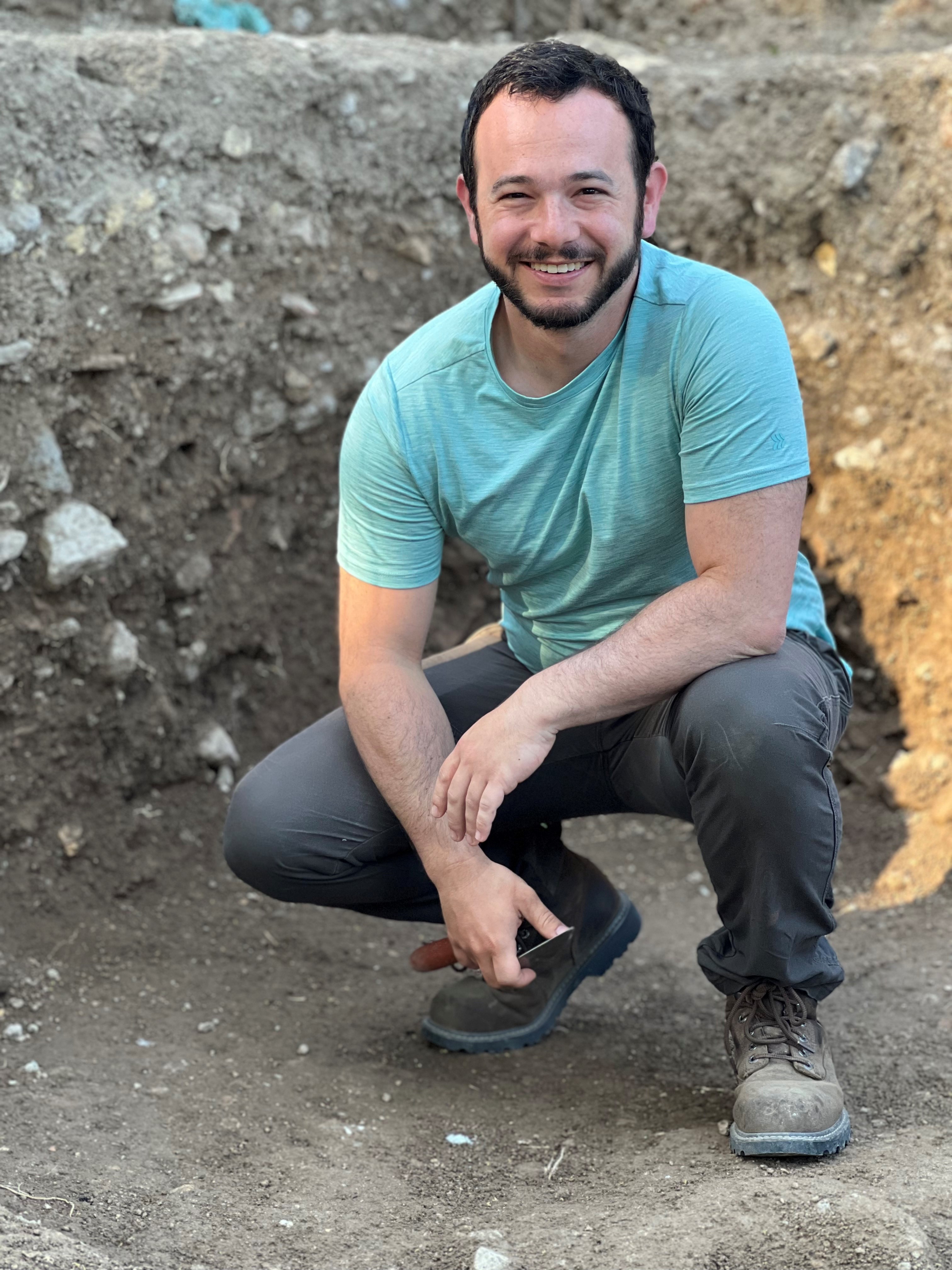
2022
Alex Moskowitz, Ph.D. candidate at the University of Michigan within the Interdepartmental Program for Classical Art and Archaeology, is the 2022 recipient of the Olivia James Traveling Fellowship. His dissertation project, “Fracturing Narratives of Colonization: Views of Early Iron Age Sicily Through Metals and Metallurgy,” studies the metals and metallurgy of Sicily from 900-500 BCE through a community-focused lens that removes the ethnic and cultural labels. By analyzing the material remains associated with metallurgy, including workshop installations, tools, and casting molds, as well as the metal objects themselves within the storerooms of museums throughout Sicily, Mr. Moskowitz conducts ground-up reanalysis of metals and metallurgy in Sicilian society that foregrounds the dynamics within and between individual sites to recognize the formative role of micro-regional interactions in community development. The Fellowship funds will support travel to various sites around Italy.
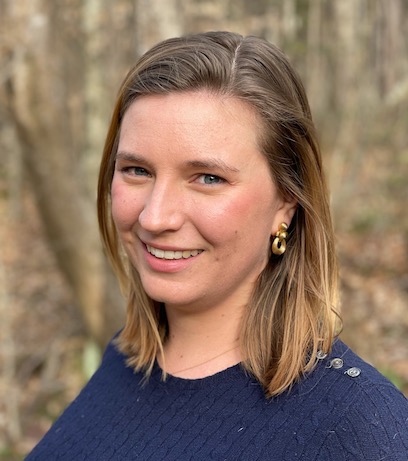
2021
Amanda Cates Ball, Ph.D. candidate in the Department of Classics at the University of North Carolina at Chapel Hill, is the 2021 recipient of the Olivia James Traveling Fellowship. Her dissertation project, “Identity Formation in Sacred Contexts of Aegean Thrace,” explores Greek and Thracian interaction and identity formation in four sanctuaries of the littoral northern Aegean and the northernmost islands: the Sanctuary of the Great Gods on Samothrace, the Sanctuary of Apollo at Mesembria-Zone, the Herakleion on Thasos, and the Acropolis of Oisyme. The Fellowship funds will support travel to the sanctuary sites, museum storerooms and excavation storage facilities, sites of the western Black Sea littoral for comparanda, and to the library of Archaeology and Art History in the School of History and Archaeology at Aristotle University of Thessaloniki in order to conduct archival work and analysis.
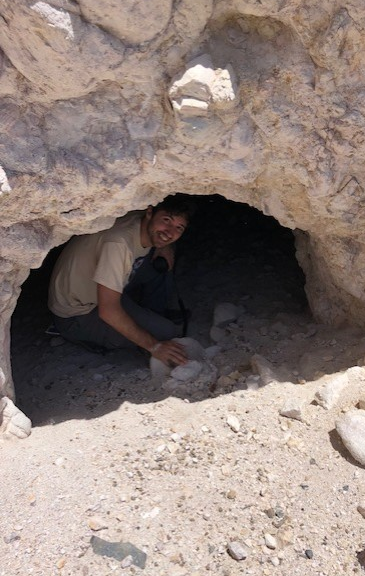
2020
Brandon Todd Baker, Ph.D. candidate in the Department of Classics at the University of North Carolina at Chapel Hill, is the 2020 recipient of the Olivia James Traveling Fellowship. His dissertation project, “The Roman Karystia,” involves revisiting Roman material collected from the Paximadhi, Kampos, and Bouros-Kastri surveys, and other relevant data from landscape studies and excavations, with the aim of writing a Roman settlement history of this region of southern ancient Euboea (modern Evia). The Fellowship funds will support travel to conduct archival work and analysis of survey finds at the Archaeological Museum of Karystos, as well as site reconnaissance of the area.
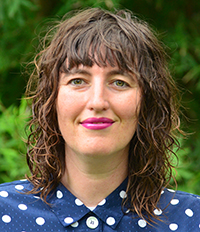
2019
Cassandra Donnelly, Ph.D. candidate in the Department of Classics at the University of Texas at Austin, is the 2019 recipient of the Olivia James Traveling Fellowship. Her dissertation project, “Writing and Economy in the Late Bronze Age Mediterranean,” is a paleographic and diplomatics study of the interaction between local script traditions in the Late Bronze Age Eastern Mediterranean; her hypothesis is that local script traditions such as Cypro-Minoan, unlike the international cuneiform and Linear B scripts, developed outside palatial administration. She will use the fellowship funds to analyze potmarks on excavated materials from sites in Cyprus, Israel, Turkey and Greece.

2018
Tim Shea, Ph.D. candidate in the Department of Art, Art History, and Visual Studies at Duke University, is the 2018 recipient of the Olivia James Traveling Fellowship. His dissertation project, “Trailblazers and Trendsetters: Immigrants and Their Tombstones in Classical Athens,” examines tombstones from the late 6th and 5th century BCE in Athens to discover how immigrants were incorporated into, or excluded from, the major cemeteries of Athens, with a focus on the Kerameikos, Syntagma Square, Kotzia Square, and Piraeus cemeteries.. The fellowship will support travel around the Aegean and Eastern Mediterranean to document the different tombstone styles of these immigrants’ poleis, to see whether these styles are preserved in Athens, or if Athenian modes of marking burials are adopted instead.
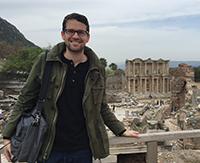
2017
Benjamin Crowther, Ph.D. candidate at the University of Texas at Austin, is the 2017 recipient of the Olivia James Traveling Fellowship. His project, entitled “Life on the Streets: Architecture and Community along the Colonnaded Avenues of the Roman Empire (1st-4th c. CE)”, repopulates the colonnaded avenues of the Roman world over the course of their existence to explore how city dwellers across the empire perceived and employed the public architecture of their cities. He will examine archaeology, architectural analysis, and epigraphy to consider these monumental avenues, examining not only their functional and aesthetic values, but also ancient perceptions of them and their role within the Roman cityscape. The fellowship will allow Mr. Crowther to survey a substantial number of sites throughout Turkey, Greece, and Morocco, as well as study excavation records from the Belgian mission to Syrian Apameia.
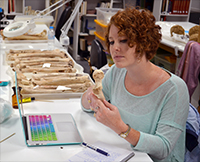
2016
Kaitlyn Stiles, Ph.D. candidate at the University of Tennessee, is the recipient of the 2016 Olivia James Traveling Fellowship. Her doctoral project, “Biosocial Identities in Late Bronze Age Greece”, integrates theory and method from Bronze Age Aegean archaeology, classics, and biological anthropology to examine the biological and social expression of Mycenaean identities in the Late Helladic IIB-IIIB phases (15th-13th centuries BCE) of East Lokris (central Greece) in relation to the expansion of Mycenaean culture during this time. With the support of the fellowship, Ms. Stiles will conduct analysis of skeletal remains at the Wiener Laboratory of the American School of Classical Studies in Athens, study library sources in the Blegen Library there, and travel to sites with chamber tomb cemeteries and other relevant sites.
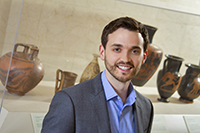
2015
Brian Martens, Ph.D. candidate with the School of Archaeology at the University of Oxford, is the 2015 recipient of the Olivia James Traveling Fellowship. His doctoral project, “Marble Divine Statuettes from the Excavations of the Athenian Agora,” examines a group of statuettes from the excavations of the Athenian Agora and seeks to understand what these sculptures ‚Äì in terms of their archaeological contexts and contexts of use ‚Äì reveal about the history of Athenian and Greek religion. Mr. Martens will use the Fellowship to support a nine-month residency in Athens at the American School for Classical Studies to conduct research at the Agora, as well as for travel to regional museums in Greece for the study of comparative materials.
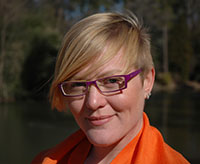
2014
Elizabeth P. Baltes, Ph.D. candidate with the department of Art, Art History & Visual Studies at Duke University, is the recipient of the 2014 Olivia James Traveling Fellowship. Her project “The Dedication and Display of Portrait Statues in Hellenistic Greece: Spatial Practices and Identity Politics”, examines the evolving statue landscapes throughout Greece to better understand the political, social, and spatial dynamics depicted in portraits of the Hellenistic period. With the support of the Fellowship, Ms. Baltes plans on conducting on-site examinations of foundations and statue bases. Her project activities will include travel to Greece where she will examine Hellenistic statues. She will also have the opportunity to visit the Blegen Library at the American School of Classical Studies in Athens as well as photographic archives held by the √âcole Fran√ßaise d’Ath√®nes and the Deutsche Arch√§ologische Institut.
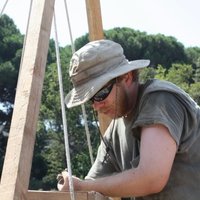
2013
William Flint Dibble, Ph.D. candidate with the Department of Classics at the University of Cincinnati, is the recipient of the 2013 Olivia James Traveling Fellowship. His project “From Village Lifestyle to Urban Lifestyle: Variability in Human-Animal Interaction in Ancient Greece (ca. 1200-400 B.C.E.)”, examines ancient human-animal interactions from the Late Bronze Age through the Early Classical period in Greece (1200-400 B.C.E.), a period of increasing urbanization. In particular he will undertake a zooarchaeological study of two large faunal assemblages (Nichoria and Athens) and two smaller assemblages (Azoria and Corinth), looking for evidence that reveals long-term changes in economy and society. Research will be conducted at the American School of Classical Studies at Athens, in Corinth, and at the Institute for Aegean Prehistory, East Crete, and the award funds will be used towards travel, housing and various research expenses.
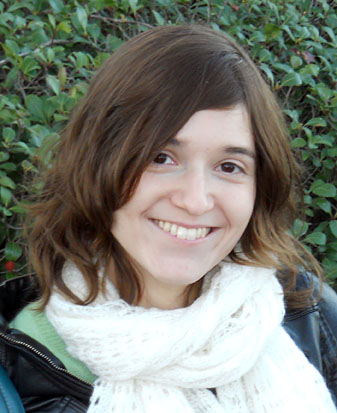
2012
Rebecca Worsham, PhD. candidate with the University of North Carolina at Chapel Hill, is the 2012 recipient of the Olivia James Traveling Fellowship. Her project and dissertation topic is “Houses, Settlements, and Social Complexity in Middle Helladic Greece”. The Middle Helladic (MH) of 2000-1600 BC is a culture that until recently has lacked a synthesized treatment, impeding our understanding of pre-Mycenaean culture and the emergence of Mycenaean states. With the support of the Fellowship, Ms. Worsham plans to undertake a comprehensive study of MH domestic architecture and settlement structures. She hopes to provide a formal analysis of house and settlement types, and a model of the households and social dynamics that created them. Her fellowship activities will include travel to Greece and time at the American School of Classical Studies in Athens, as well as visiting sites in the Peloponnese and Central Greece.
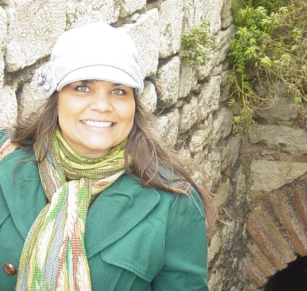
2011
Naomi Pitamber, a Ph.D. candidate with the University of California, Los Angeles, is the 2011 recipient of the Olivia James Traveling Fellowship. Her project and dissertation topic is “Re-Placing Byzantium: Laskarid Urban Environments and the Landscape of Loss (1204-1261)”. The Laskarid dynasty rose to power following the fall of Constantinople to crusading knights, and the dynasty remains the logical cultural link between the Komnenian dynasty that ruled before Constantinople’s fall (1081-1185) and the Palaiologan dynasty that flowered after its recovery (1261-1453). To date, no synthetic study has been undertaken on the corpus of Laskarid materials. Ms. Pitamber will use the $25,000 award to define and interpret the art, architecture and material culture of the Laskarid period. Her project activities will include travel to Turkey and Greece, where she will survey Laskarid architecture, examine archaeological finds in museums, and work in several special library collections. Part of her time will be spent at the American Research Institute in Turkey, Istanbul.
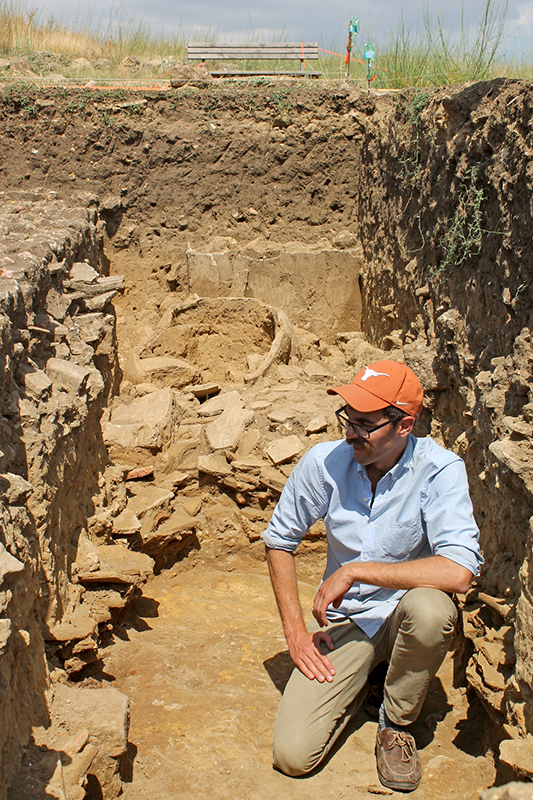
2010
Denton Alexander Walthall, a doctoral candidate with Princeton University, is the 2010 recipient of the Olivia James Traveling Fellowship. His project, and dissertation topic, is “A Measured Harvest: Grain, Tithes, and Territories in Hellenistic and Roman Sicily (276-31 BC)”. During the 3rd through 1st centuries BC, the exploitation of Sicilian grain became instrumental to the expansion and consolidation of political and military power for the Syracusan monarch Hieron II and later for Rome and its growing empire While much of the evidence for this is textual, there is also a substantial body of archaeological evidence. Mr. Walthall will use the $25,000 fellowship award to further his work on the material elements of this agricultural administration–grain measures, monumental granaries, legal inscriptions, and patterns of rural land use. His project activities will include travel in Sicily, Italy and Greece, to examine excavation materials from a number of sites which are currently housed in museums, and to access the Blegen Library at the American School of Classical Studies on Athens.

2009
The 2009 recipient of the Olivia James Traveling Fellowship is Elizabeth Robinson, a graduate student at the University of North Carolina at Chapel Hill. Elizabeth will use her fellowship award to support her dissertation research, “Larinum: A Case Study for the Romanization of Southern Italy.” Using Larinum (modern Larino) as a case study, Robinson aims to provide a comprehensive and coherent picture of cultural change from the fourth century B.C. to the first century A.D. Her work will examine archaeological remains and historical records, including unpublished votive deposits and tomb assemblages. The $25,000 award provides funding for her travel and research in Larino itself, as well as to the Soprintendenza’s Storerooms at Isernia and Campobasso to examine the unpublished materials.
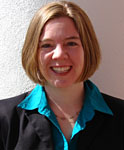
2008
The 2008 recipient of the Olivia James Traveling Fellowship is Rebecca Benefiel, with the Department of Classics, Washington and Lee University. Her project is “Pompeii and her Neighbors: Civic Identity, Social Interaction, and Ancient Graffiti”. Noting that ancient Pompeii has often been studied in isolation, the goal of Dr. Benefiel’s project is to reintegrate the city into its surroundings. The project’s key to reconstructing Pompeii’s place in the regional network of cities and hinterlands is its graffiti: “Ancient graffiti, more than any other medium, reveal a dynamic system of economic and social networks tying together the communities of the region. These messages repopulate the city and indeed the whole region with vibrant activity, individual voices, and fascinating details of ancient life.” Dr. Benefiel will spend her fellowship tenure documenting and studying these unique documents and how they illustrate social interaction, the presence of visitors in the city, and steady exchange between Pompeians and its environs.
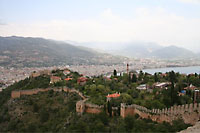
2007
Suzan Yalman, Harvard University, is undertaking the first comprehensive study of architectural patronage under the Anatolian Seljuk sultan Alaeddin Keykubad. She is exploring his choices and commissions in terms of religion, urban planning, and identity to shed light on this renowned medieval Islamic ruler’s own architectural legacy in Anatolia and on a period of “transformation” in the history of Islamic architecture. Outside of Turkey, few Western scholars have worked on the Seljuk period, so this research is the first study of its kind. The medieval town of Alaiyya (former Kalonoros, modern Alanya) was perhaps the greatest creation of the Anatolian Seljuk ruler Alaeddin Keykubad (r.1220-37).